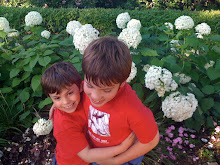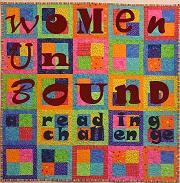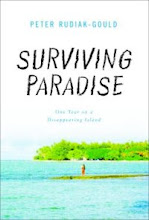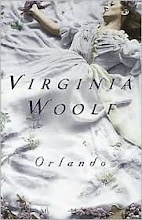In the beginning of the month, I read about a reading challenge on a lovely blog called "Nonsuchbook", one in which the author along with 3 friends were going to read and discuss four of Virginia Woolf's novels: Mrs. Dalloway, To the Lighthouse, Orlando and The Waves. They would begin the online discussions in the blogosphere starting with Mrs. Dalloway on January 15th. So being a fan of VW, and having not a lot of opportunity to discuss her fiction for quite some time (my current bookgroup shies away from stream of consciousness fiction), I thought it would be fun to join in and see how it went with the online version.
I have no time to describe my plans. I should say a good deal about The Hours, & my discovery; how I dig out beautiful caves behind my characters; I think that gives exactly what I want; humanity, humour, depth. The idea is that the caves shall connect, & each comes to daylight at the present moment
-Virginia Wolf, in her diary, August 30, 1923.
I first read Mrs. Dalloway in a 20th century fiction course in college. The opportunity to be led through her difficult writing style by my professor was marvelous, and forever changed the way I read books. I have not encountered many novels in which the entire plot occurs over the course of one day, and I often wonder why not. Mrs. Dalloway is so beautifully constructed and leads us through Clarissa's whole life, it would seem an ideal model to follow. Of course I was surprised and thrilled to read The Hours by Michael Cunningham many years later, where he contructs a modern day Clarissa Dalloway and a party she is preparing. Cunningham thus does employ "the model", with prose also extraordinary in it's resonance. I'm sure if I tried, I might find more examples.
What I loved about Mrs. Dalloway was the bringing together of the worlds in England, the upper classes, post WWI and struggling with change, and those who would begin to lead England into a more modern and less restrictive society. This is how sublte a writer does things, creates the description of one small world, and in doing so lets us see a larger whole. Woolf at her best does this over in over in her writing.
(link to nonsuchbook.typepad.com for the Woolf In Winter reading challenge instructions)
http://nonsuchbook.typepad.com/nonsuch_book/ for the January 15th discussion
Addition on Jan 16th:
a partial list of those blogging about Mrs. Dalloway from Emily at eveningallafternoon.com
- Our lovely host Sarah at what we have here is a failure to communicate
- Amy at New Century Reading
- Anthony at Times Flow Stemmed
- Becca at Bookstack
- Belleza at Dolce Belleza
- Care at Care's Online Book Club
- Christy at Lil Bit Brit Lit
- Claire at Kiss a Cloud
- Eva at A Striped Armchair
- Frances of Nonsuch Book
- Jason at Moored at Sea
- JoAnn at Lakeside Musings
- Julia at A Number of Things
- Karen at BookBath
- Kaye at Kaye's Book Review Page
- Kristine at BasBleuBookshelf
- Lindsey at Sparks' Notes
- Lu at Regular Rumination
- Nicole at Bibliographing
- Rebecca at Rebecca Reads
- Richard at Caravana de recuerdos
- Sandra at Fresh Ink Books
- Simon at Savidge Reads
- uncertainprinciples at anothercookiecrumbles
- Victoria at Views from the Page and the Oven
- Violet at Still Life with Books
- Paula at bloggingwolf










It sounds like I had a similar experience to yours - reading Mrs. Dalloway (and subsequently other Woolf) in college changed the way I read books forever, as well. Made me a more careful, attentive reader, and opened my eyes to the multitude of possibilities language holds.
ReplyDeleteThanks for the lovely post!
I love that excerpt from Woolf's diary! Thank you for sharing it. :)
ReplyDeleteI agree that Mrs. Dalloway is beautifully constructed, Kristine, and I like that you mentioned the class issues that most people seem to have passed over (I'm slowly making my way through all the other Woolf in Winter write-ups, but I haven't really seen that facet of the novel discussed much yet). Anyway, nice post--and how cool that you got to study Woolf in college (sadly, this was my first exposure to her). Cheers!
ReplyDeleteI, too, came into it for the first time. How lovely that your professor was a positive influence on your reading. Often I hear groans about how their school reading destroyed a book for them.
ReplyDeleteI love this passage you wrote: "This is how sublte a writer does things, creates the description of one small world, and in doing so lets us see a larger whole. Woolf at her best does this over in over in her writing."
Going in To the Lighthouse, that is an enlightenment. Thanks.
Richard--I think the class consciousness as a subject in early 20th century English lit is a very interesting discussion point. Especially after WW1 and all that european society suffered. Things really started changing then for the middle and lower classes, but probably not as much as after WW2. (?)
ReplyDeleteClaire-I was lucky to get into that class, it was a seminar for English majors and I was their "token" scientist (I majored in geology). I don't think I would have had a very easy time of going through Woolf on my own-so it was great to be there with those who made it fun and enjoyable, and were busy talking about VW's beautiful language and imagery. I like to place novels (sometimes) in the context of the world in which they were written. It's also helpful to read VW's bio, and know of some of the lives of her friends.